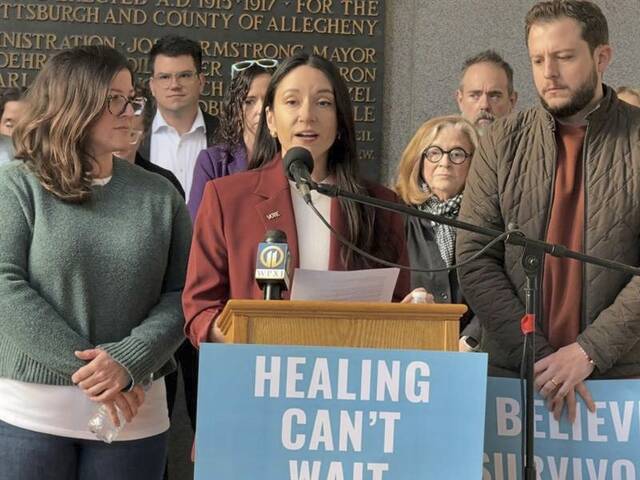https://triblive.com/local/healing-held-hostage-sex-assault-survivor-warns-pa-budget-impasse-imperils-rape-crisis-centers/
‘Healing held hostage’: Sex assault survivor warns Pa. budget impasse imperils rape crisis centers

With trembling hands but a steady voice, Maria Gardner stepped up to the podium outside city hall in Downtown Pittsburgh to speak publicly for the first time about the day she was sexually assaulted.
Flanking Gardner were her husband and an advocate from Pittsburgh Action Against Rape, a quiet show of support as she began to share her story.
Gardner decided she was ready — not only to reclaim her history but to put a survivor’s face to the financial strain rape crisis centers are facing as Pennsylvania’s monthslong budget impasse continues to block funding.
“Survivors of sexual violence should not need to publicly lay bare their most vulnerable moments to compel Pennsylvania legislators to pass the state budget — and yet, here we are,” Gardner said.
TribLive does not typically name victims of sexual assault. In this case, however, Gardner said she wanted to be a voice for survivors who do not have access to the same resources as she did while going through the criminal justice process.
The Pennsylvania Coalition to Advance Respect and state Sen. Lindsey Williams, D-Allegheny, joined Gardner at the news conference, which was organized by Pittsburgh Action Against Rape. They implored lawmakers to restore critical funding to rape crisis centers across the state.
‘I didn’t make any choices’
In August 2021, Gardner — 10 weeks pregnant — was taken to UPMC Magee-Womens Hospital after being sexually assaulted by a stranger along the Allegheny River during her lunch break.
Gardner lived on the North Side at the time and often walked across the Roberto Clemente Bridge and down the trail connecting to Point State Park as part of her daily routine.
That sunny Wednesday morning, however, Gardner found herself — gravel still stuck in her skin from fighting back — recounting the attack repeatedly for a series of detectives and doctors.
While Gardner waited for her husband, Dan Gardner, to arrive at the hospital, an advocate from Pittsburgh Action Against Rape showed up to support her and explain the process of the forensic medical exam.
“She told me that if there’s anything you don’t want them to do, you can tell them that you don’t want them to … that was like mind blowing for me because I had just gone through an experience where I didn’t make any choices,” Gardner told TribLive. “I was stripped of my agency, and to have her say that, it brought me back to reality.”
For survivors like Gardner, rape crisis centers are more than just a source of information.
Pittsburgh Action Against Rape is one of 47 such centers in Pennsylvania and currently has 43 staffers after recently eliminating two positions.
The group implemented a spending freeze, instructed workers to avoid buying supplies and asked vendors to accept late payments or allow invoices to be paid slowly over time as its cash flow dries up, as reported by TribLive this past week.
Caught in the middle
At the news conference, Yolanda Edrington, CEO of Pennsylvania Coalition to Advance Respect, spoke about the history of state funding for rape crisis centers.
In August, TribLive reported that for the fifth consecutive year, proposed funding for rape crisis centers stayed flat at just under $12 million. Meanwhile, last year, domestic violence centers received a 12.4% increase, which brought their funding to over $22 million.
“For more than five years, these programs have faced flat funding, with calls and needs continuing to grow. Now, after more than three months — 108 days without state funding — they are past their breaking point,” Edrington said.
“Survivors have been placed in the middle of partisan politics, their healing held hostage by gridlock.”
‘You did a really good job’
Adrienne Melillo, who acted as Gardner’s support at the news conference, began volunteering for Pittsburgh Action Against Rape in 2020. She had been working as an advocate for a little over a year when she read Gardner’s impact statement to the judge presiding over her assailant’s trial.
“Adrienne told me that this (trial) is not about closure, this is not about healing, this is about protection for other people and accountability, and the court system is not going to be fun, and it is going to be retraumatizing in certain ways,” Gardner said.
Gardner and her husband said they could not have survived the trauma without the help of an advocate like Melillo.
During an interview with TribLive, Gardner became teary-eyed when asked about her daughter, with whom she was pregnant during the attack.
Gardner turned to Melillo for support once again.
“A difficult thing for you to reconcile the fact that you know your daughter was with you,” Melillo said to Gardner.
“We did everything we could do to protect her,” Gardner said.
“You did a really good job,” Melillo reassured her.
‘Survivors can’t wait’
Police arrested Gardner’s attacker a day after the assault. He was convicted in February 2022 of sexual assault and other charges and is serving a 25-year prison sentence.
Almost four years later, Gardner said she wants to ensure other survivors have the resources they need.
“It took me a long time to feel like I regained my autonomy, and I don’t even want to say that it fully feels back,” Gardner said.
“I fear that unless lawmakers come face to face with the people hurt by their inaction, they will continue to write survivors off as another line and a spreadsheet that can wait.”
“Survivors can’t wait.”
Correction: This story story originally contained an incorrect number for rape crisis funding.
Copyright ©2026— Trib Total Media, LLC (TribLIVE.com)
